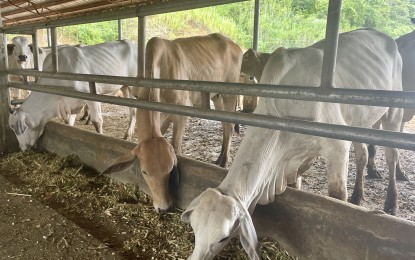
VALUE-ADDING FARMING. Branded cattle are raised in a farm located in Barangay Sucsuquen in Piddig, Ilocos Norte province in this undated photo. Farmers in the area are taught how to maximize the potential of their animals to earn more profit through value-adding farming. (Photo by Leilanie Adriano)
LAOAG CITY – Hundreds of branded cattle are being taken care of in a remote village of Sucsuquen in Piddig, Ilocos Norte province to jumpstart a multi-billion dollar industry that could reduce poverty and promote agri-business development in this part of the country.
The project, known as Piddig Wagyu cross and branded beef development program, aims to upgrade the native cows in Ilocos Region through artificial insemination of Wagyu semen.
Wagyu is a Japanese beef cattle used in the production of high-quality and flavorful meat. Because of the way it is raised, Wagyu is more expensive than other types of steak.
In a multi-sectoral forum held at the municipal session hall of Piddig town on Tuesday, various government agencies and private partners committed their support to the program to make Ilocos Norte the home of branded beef products in the future.
“The Wagyu cross and branded beef development program is another breakthrough project of Piddig,” said town mayor Gina Guillen, adding that the project is meant to maximize the potential of the livestock industry here through a convergence program involving both the government and private entities.
Initiated during the term of former Piddig town mayor Eduardo “Eddie" Guillen, husband of the incumbent mayor, the project has so far received a grant of at least PHP100 million from the Department of Agriculture (DA).
“This is a landmark project in Piddig. We know that livestock really carries a great potential for our farmers. It is an underserved area and we are hoping that this can provide an additional livelihood to our farmers,” added Governor Matthew Joseph Manotoc, citing that with the current inflation, farmers need multiple revenue streams.
Arnel Corpuz, a former overseas Filipino worker and owner of Adelaide River Farms based in General Santos City who has been assisting the Wagyu cross development program in Piddig town, said farmers need not sell or butcher their cattle if they are thin and have not reached their maximum potential yet.
After having worked with a cattle farm in Australia, Corpuz applied the technology he learned there on his own farm and shared his knowledge to other interested livestock raisers across the country. He said he eventually realized that value-adding farming is the real deal to generate more profit.
Value-adding farming means maximizing the potential of a cattle that can grow up to 180 kilos for 100 days, given the right mix of feeds before it goes to the slaughterhouse.
As of July, farm veterinarian Leon Palitayan reported that a total of 201 cows and heifers have already been inseminated with Wagyu semen, 101 of which were confirmed pregnant in Piddig town.
"In the first batch of semen that we used, we confirmed 96 pregnant out of the 271 total inseminations, which gives us a 35.42 % conception rate and 35.05 % pregnancy rate,” he said.
For the second batch, Palitayan added that 30 more inseminations were conducted from May to July this year, covering the different barangays of Piddig. The first Wagyu crossbred calf out of the successful artificial inseminations conducted under the project is expected to come out this August.
As agreed upon with the farmer-cooperators, the owner is assured of free insurance coverage courtesy of the Philippine Crop Insurance Corporation and free artificial insemination service, as well as vitamins and dewormers provision among others from the municipal government and the DA.
This is aside from the provision of a ready market because the farmers’ cooperative will buy their calves once they are ready to wean. Aside from the marketing assistance, farmers can also earn extra by growing corn silage or Napier grass for the dairy farm of the cooperative, which aims to introduce outstanding genetics like Wagyu.
The Piddig government assured the farmers that all the farm inputs will be provided to them for free and their only counterpart is labor. (PNA)
